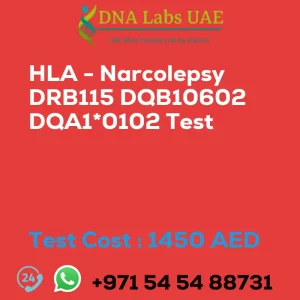HLA – B22 B*22 Test
Components
Price: 1010.0 AED
Sample Condition: 4 mL (3 mL min.) whole blood in 1 Lavender Top (EDTA) tube OR 6 mL (3 mL min.) whole blood in 1 Yellow Top (ACD) tube. Ship refrigerated. DO NOT FREEZE.
Report Delivery: 10-12 days
Method: Reverse SSOP – Luminex
Test type: Disease Association
Doctor: Physician, Rheumatologist, Gastroenterologist
Test Department:
Pre Test Information
No special preparation required
Test Details
HLA-B22, also known as HLA-B*22, is a specific human leukocyte antigen (HLA) gene variant. HLA genes encode proteins that are involved in the immune system’s recognition of self and non-self cells. These proteins play a crucial role in determining the compatibility between the immune system and transplanted organs, as well as in the susceptibility to certain diseases.
The HLA-B22 gene variant is characterized by a specific set of genetic variations in the HLA-B gene region. Testing for HLA-B22 involves analyzing a person’s DNA to identify these specific genetic variations.
HLA-B22 is associated with an increased risk for certain autoimmune diseases, such as ankylosing spondylitis and psoriasis. It is also relevant in the field of organ transplantation, as the HLA-B22 variant can affect the compatibility between the donor and recipient in certain cases.
HLA-B22 testing can be performed for various reasons, including:
- Organ transplantation: HLA matching between the donor and recipient is crucial for successful organ transplantation. Testing for HLA-B22 can help determine the compatibility between the donor and recipient, particularly in cases where the recipient has HLA-B22.
- Disease susceptibility: HLA-B22 has been associated with an increased risk for certain autoimmune diseases. Testing for HLA-B22 can help assess an individual’s susceptibility to these diseases and aid in their diagnosis.
- Population studies: HLA-B22 testing is also performed in population studies to understand the distribution and frequency of this gene variant among different ethnic groups.
HLA-B22 testing is typically performed using molecular techniques, such as polymerase chain reaction (PCR) or DNA sequencing, to identify the specific genetic variations associated with this gene variant. It is important to note that HLA testing is typically performed in specialized laboratories and is ordered by healthcare professionals.
The results of HLA-B22 testing should be interpreted in conjunction with other clinical and laboratory findings to determine their significance and implications for an individual’s health.
| Test Name | HLA – B22 B*22 Test |
|---|---|
| Components | |
| Price | 1010.0 AED |
| Sample Condition | 4 mL (3 mL min.) whole blood in 1 Lavender Top (EDTA) tube OR6 mL (3 mL min.) whole blood in 1 Yellow Top (ACD) tube. Ship refrigerated. DO NOT FREEZE. |
| Report Delivery | 10-12 days |
| Method | Reverse SSOP – Luminex |
| Test type | Disease Association |
| Doctor | Physician, Rheumatologist, Gastroenterologist |
| Test Department: | |
| Pre Test Information | No special preparation required |
| Test Details |
HLA-B22, also known as HLA-B*22, is a specific human leukocyte antigen (HLA) gene variant. HLA genes encode proteins that are involved in the immune system’s recognition of self and non-self cells. These proteins play a crucial role in determining the compatibility between the immune system and transplanted organs, as well as in the susceptibility to certain diseases. The HLA-B22 gene variant is characterized by a specific set of genetic variations in the HLA-B gene region. Testing for HLA-B22 involves analyzing a person’s DNA to identify these specific genetic variations. HLA-B22 is associated with an increased risk for certain autoimmune diseases, such as ankylosing spondylitis and psoriasis. It is also relevant in the field of organ transplantation, as the HLA-B22 variant can affect the compatibility between the donor and recipient in certain cases. HLA-B22 testing can be performed for various reasons, including: 1. Organ transplantation: HLA matching between the donor and recipient is crucial for successful organ transplantation. Testing for HLA-B22 can help determine the compatibility between the donor and recipient, particularly in cases where the recipient has HLA-B22. 2. Disease susceptibility: HLA-B22 has been associated with an increased risk for certain autoimmune diseases. Testing for HLA-B22 can help assess an individual’s susceptibility to these diseases and aid in their diagnosis. 3. Population studies: HLA-B22 testing is also performed in population studies to understand the distribution and frequency of this gene variant among different ethnic groups. HLA-B22 testing is typically performed using molecular techniques, such as polymerase chain reaction (PCR) or DNA sequencing, to identify the specific genetic variations associated with this gene variant. It is important to note that HLA testing is typically performed in specialized laboratories and is ordered by healthcare professionals. The results of HLA-B22 testing should be interpreted in conjunction with other clinical and laboratory findings to determine their significance and implications for an individual’s health. |








